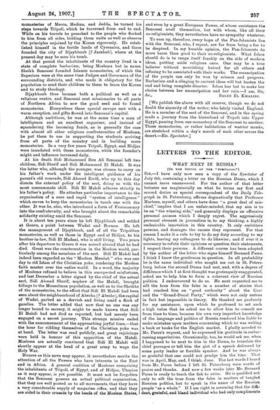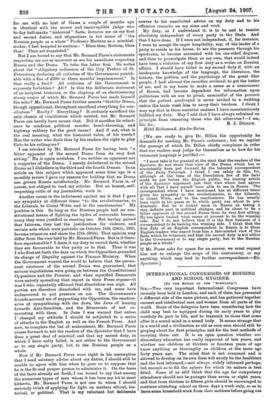LETTERS TO THE EDITOR.
WHAT NEXT IN RUSSIA ?
[TO T116 51/1105 01/ T1111 “9eacrrAres.."1 SIE,—I have only now seen a copy of the Spectator of July 6th, containing a letter on the Russian Dams, which. I cannot leave unanswered. For the author of that letter lectures me magisterially on what he terms my first and second duties as special correspondent of the Daily Tele- graph in St. Petersburg, affirms dogmatically that Professor Martens, myself, and others have done "a great deal of mis- chief," implies that I am unfair-minded, that my aim is to be on " the winning side," and generally displays an offensive personal animus which I deeply regret. The aggressively personal element in journalism is, to my thinking, a highly undesirable innovation in this country. It only embitters persons, and damages the causes they represent. For that reason I make it a rule to try to do my duty according to my lights, leaving my colleagues to do likewise ; and if ever it is necessary to refute their opinions or question their statements, I respect their persons. A different course has been adopted by the author of the letter who signs himself Bernard Pares. I think I know the gentleman in question. In all probability he is the same individual who sought me out in St. Peters- burg before the second Duma bad met, and, with a degree of diffidence which I at first thought was grotesquely exaggerated, asked me to help him to form a coherent view of Russian politics. I endeavoured to do so. He next requested me to sift the true from the false in a number of stories that had reached him on " good authority " about the Czar and the " Grand-Ducal Party," which were not only untrue in fact but impossible in theory. He thanked me profusely for my assistance, upon which he professed to set such a high value that he asked me to allow him to consult me from time to time, because his own very imperfect knowledge of the language and politics of Russia rendered him liable to
make mistakes upon matters concerning which be was writing a book or books for the English market. I gladly acceded to Mr. Pares's request, and he expressed his gratitude in embar- rassing superlatives. Occasionally, too, he would ask me, when I happened to be next to him in the Duma, to translate the chief passages or tell him the gist of a speech delivered by
some party leader or forcible speaker. And he was always so grateful that one could not grudge him the time. That
was in April, May, and, I think, June. The last words I heard
from Mr. Pares before I left St. Petersburg were words of praise and thanks. And now a few weeks later Mr. Bernard
Pares is ready to teach the fish to swim. He is qualified not only to sift the true from the false in matters of tangled Russian politics, but to speak in the name of the Russian
people "as a whole." If I am right in assuming that the diffi- dent, grateful, and bland individual who had only compliments
for me with no hint of blame a couple of months ago is identical with the severe and incorruptible judge who to-day hall-marks " historical " facts, lectures me on my first and second duties, and stigmatises in the name of " the Russian people as a whole " Professor Martens as a mischief- maker, I feel tempted to exclaim : " Bless thee, Bottom, bless thee! Thou art translated."
But I am bound to say that Mr. Bernard Pares's statements respecting me are as incorrect as are his assertions respecting Russia and the Duma. To take the latter first. He writes about the "obligatory ordinance of the City Prefect of St. Petersburg declaring all criticism of the Government punish- able with a fine of £300 or three months' imprisonment." Is that really a fact ? All criticism of the Government is expressly forbidden ? All ? Is this the deliberate statement of an incipient historian, or the claptrap of an electioneering stump orator of which Mr. Bernard Pares has made himself the echo ? Mr. Bernard Pares further asserts "that the Duma, though oppositional, throughout sacrificed everything for con- ciliation." Really ? Everything ? It certainly sacrificed the only chance of conciliation which existed, but Mr. Bernard Pares can hardly have meant that. Did it sacrifice its reluct- ance to condemn political murder, bomb-throwing, and highway robbery for the good cause? And if not, what is the real meaning, what the historical value, of his words ? Has the writer who deals thus by his readers the right to play Cato to his colleagues ?
I am rebuked by Mr. Bernard Pares for having been "a bitter opponent of the second Duma from its very first sitting." He is again mistaken. I am neither an opponent nor a supporter of the Duma. I merely disbelieved in the second Duma as I disbelieve in the third and the fourth Dumas. In an article on this subject which appeared some time ago in a monthly review I gave my reasons for holding that no Duma can govern Russia satisfactorily. Mr. Bernard Pares is, of course, not obliged to read my articles. But an honest, self- respecting critic of my journalistic work is.
Another count in the indictment against me is that I gave my sympathy at different times "to the revolutionaries, to the Liberals, to Count Witte, and to the reactionaries." My position is this. So long as the Russian people had no con- stitutional means of fighting the hydra of autocratic bureau- cracy they were justified in creating one. But having gained that fulcrum, they lost the justification for violence, and certain acts which were patriotic on October 16th (29th), 1905, became crimes on and since the 17th (30th). That opinion may differ from the view held by Mr. Bernard Pares. But is it there- fore reprehensible? I deem it my duty to record facts, whether they are favourable to this party or to that. Thus it was I who first set forth the data on which the Opposition grounded its charge of illegality against the Finance Ministry. When the Government wanted the world to believe that the perma- nent existence of the second Duma was guaranteed, that serious negotiations were going on between the Constitutional Opposition and the Premier, and when mystified Democrats were naïvely spreading that report in their Press organs—it was I who repeatedly affirmed that dissolution was nigh. All parties are therefore dissatisfied with me, and some have endeavoured to put pressure on me. The Government's friends accused me of supporting the Opposition, the reaction- aries of sympathising with the Jews, the Jews of leaning towards Anti-Semitism, and the Democrats of not co- operating with them. In June I was warned that unless I changed my attitude I should be subjected to a series of attacks in the English as well as the French Press. And now, to complete the list of malcontents, Mr. Bernard Pares comes forward to tell the readers of the Spectator that I have done a great deal of mischief, and that my sacred duty, in which I have sadly failed, is not either to the Government or to any single party, but to the Russian people as a whole.
Now if Mr. Bernard Pares were right in his assumption that I need salutary advice about my duties, I should still be unable to agree with him when he goes on to suppose that he is the fit and proper person to administer it. On the basis of the facts already set forth, I am bound to say that among the numerous types of men whom it has been my lot to meet hitherto, Mr. Bernard Pares is not one to whom I should seriously think of applying for light on matters ethical, his- torical, or political. That is my reluctant but deliberate answer to his unsolicited advice on my duty and to his offensive remarks on my aims and work.
My duty, as I understand it, is to be and to remain absolutely independent of every party in the State. And that I have done. If I were not independent, if, for instance, I were to accept the eager hospitality, say, of the leader of a party to reside in his house, to see the peasants through his spectacles, to become saturated with his one-sided dogmas, and then to promulgate them as my own, that would indeed have been a violation of my first duty as a writer on Russian affairs. I should have failed in my second duty if, with an inadequate knowledge of the language, the literature, the history, the politics, and the psychology of the great Slav people, I had allowed the cacoethes scribendi to get the better of me, and in my haste to make a name as a connoisseur of Russia, had become dependent for information upon politicians with an axe to grind, unmindful of the proverb that the patient quadruped is never invited to a wedding unless the hosts want him to carry their burdens. I think I may say that in these essential matters I have conscientiously fulfilled my duty. May I add that I have always refrained on principle from censuring those who did otherwise P—I am, Sir, &c., E. J. DILLoN. Hotel Richenzond, Aix-les-Bains.
[We are ready to give Dr. Dillon the opportunity he demands for meeting Mr. Pares's criticisms ; but we reprint the passage of which Dr. Dillon chiefly complains in order that our readers may judge for themselves as to how far his vehement language is justified :—
" I must take it for granted at the start that the readers of the Spectator do not share that view of the Duma which has so consistently been put forward by the talented correspondent of the Daily Telegraph. I think I can safely do this, for, although at the time of the Dissolution few of the facts could be put before the English public, the leading article of the Spectator expressed just that view which best agrees with all that I have myself been able to see in Russia. The correspondent whom I have mentioned has at different times given his sympathy to the revolutionaries, to the Liberals, to Count Witte, and to the reactionaries. He has usually been right in his guess as to which party was about to pre- dominate. But he is looked upon in Russia as taking a very definite part in political changes, and he chose to be a bitter opponent of the second Duma from its very first sitting. He has again backed what seems at present to be the winning side. But 1 do not believe that it is the first business of a correspondent to be backing the winning aide. I think that the first duty of an English correspondent in Russia is to those English readers who expect from him a fair-minded view of the facts which he witnesses, and that his second duty is not either to the Government or to any single party, but to the Russian people as a whole."
If Mr. Pares asks for space for an answer, we must request him not to enlarge the scope of the controversy, or say anything which may lead to further correspondence.—En. Spectator.]



































 Previous page
Previous page